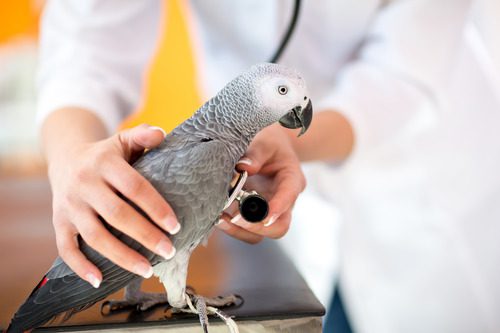Parasites in Birds: What To Look Out For
Birds are magnificent creatures that bring joy and companionship to many pet owners. However, just like any other pets, birds are susceptible to parasites that can affect their health and well-being. Understanding the types of parasites that can infest birds and recognizing the signs of an infestation is crucial for maintaining their health. At Paws and Claws Animal Medical Center in Dunedin, FL, we are dedicated to providing you with the information you need to keep your bird healthy and happy. If you suspect your bird has parasites, call us at (727) 953-6588 for professional assistance.

Common Types of Parasites in Birds
External Parasites – Mites, Lice and Ticks
External parasites live on the outside of the bird’s body and can cause a variety of problems. The most common external parasites include mites, lice, and ticks.
- Mites are tiny arachnids that can cause significant discomfort for birds. They often infest the skin, feathers, and respiratory tract, leading to itching, feather loss, and respiratory issues. Red mites are especially problematic as they feed on the bird’s blood at night.
- Lice are wingless insects that feed on the bird’s feathers and skin. They can cause itching, feather damage, and secondary infections due to scratching.
- Ticks are less common but can still affect birds, attaching themselves to the bird’s skin and feeding on their blood. Ticks can transmit diseases, making their presence particularly concerning.
Internal Parasites
Internal parasites live inside the bird’s body, often in the gastrointestinal tract, and can cause various health issues. The most common internal parasites include worms and protozoa. Worms such as roundworms, tapeworms, and cecal worms can infect birds, leading to weight loss, diarrhea, and general malaise. These parasites can be contracted from contaminated food, water, or the environment. Protozoa like Giardia and Trichomonas are microscopic parasites that can cause severe gastrointestinal issues. Symptoms may include diarrhea, weight loss, and dehydration.
Signs of Parasite Infestation
Recognizing the signs of a parasite infestation in birds is essential for early intervention. Symptoms can vary depending on the type of parasite but commonly include changes in behavior, appearance, and overall health such as:
- Feather damage or loss
- Decreased appetite
- Respiratory issues
- Skin irritation
- Weight loss
- Diarrhea
- Lethargy
- Aggression or irritability
Diagnosing Parasite Infestation
Proper diagnosis is crucial for effective treatment of parasites in birds. If you notice any signs of infestation, contact Paws and Claws Animal Medical Center at (727) 953-6588 to schedule an appointment.
Veterinary Examination
A thorough veterinary examination is the first step in diagnosing a parasite infestation. Your veterinarian will conduct a physical exam and may use tools such as a magnifying glass or microscope to identify external parasites.
Laboratory Tests
Laboratory tests can help confirm the presence of internal parasites. Common tests include:
- Fecal examination: A sample of the bird’s droppings is examined under a microscope to detect the presence of worms or protozoa.
- Blood tests: Blood tests can identify parasites that live in the bloodstream or cause systemic infections.
- Skin scrapings: For external parasites, a skin scraping may be taken and examined microscopically.
Treatment Options for Parasites in Birds
If your bird is diagnosed with a parasite infestation, your veterinarian will recommend appropriate treatment options.
Medications
Medications are often prescribed to eliminate parasites. The type of medication will depend on the specific parasite affecting your bird. Common treatments include antiparasitic medications to treat internal parasites, topical treatments applied directly to the skin to eliminate external parasites, or oral medications to treat internal parasites and may be mixed with food or water.
Environmental Treatment
In addition to treating your bird, it is important to address their environment to prevent re-infestation. Clean and disinfect the cage, perches, toys, and any other items the bird frequently contacts. Dispose of any contaminated materials and replace them with clean items.
Follow-Up Care
Follow-up care is essential to ensure the effectiveness of the treatment and to prevent recurrence. Schedule a follow-up appointment with your veterinarian to monitor your bird’s progress and to perform any necessary additional tests.
Preventing Parasite Infestation
Prevention is key to protecting your bird from parasites. By taking proactive measures, you can reduce the risk of infestation and keep your bird healthy.
- Regular Cleaning: Maintaining a clean environment is essential in preventing parasites. Ensure your bird’s cage, perches, and toys are cleaned regularly. Remove uneaten food and droppings daily to minimize the risk of contamination.
- Quarantine New Birds: When introducing a new bird to your home, quarantine them for at least 30 days. This period allows you to monitor the new bird for any signs of parasites before exposing them to other birds.
- Regular Health Check-ups: Schedule regular health check-ups with your veterinarian to catch any potential problems early. Routine examinations and fecal tests can help detect parasites before they cause significant issues.
- Proper Nutrition: Providing a balanced diet strengthens your bird’s immune system, making them less susceptible to parasites. Ensure your bird’s diet includes a variety of fruits, vegetables, seeds, and pellets to meet their nutritional needs.
Staying Informed About Your Bird’s Health
Staying informed about potential health risks, including parasites, is vital for any bird owner. By understanding the signs of parasite infestation and taking preventive measures, you can help ensure your bird remains healthy and vibrant. At Paws and Claws Animal Medical Center, we are here to support you in caring for your bird. If you have any concerns about parasites in birds or need to schedule a check-up, call us at (727) 953-6588. Your bird’s health and happiness are our priority.
